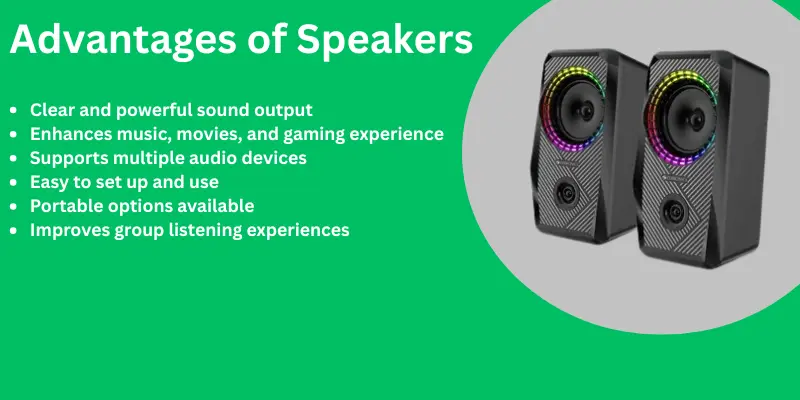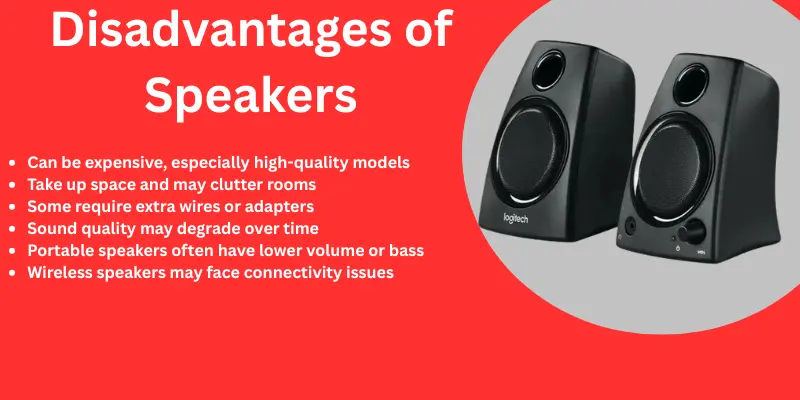Advantages and Disadvantages of Speakers You Should Know
Published: 14 Oct 2025
Speakers are a useful part of any audio setup. They turn electrical signals into sound so you can enjoy music, movies, or video calls.While types of speakers provide clear and powerful sound, not all are perfect. Understanding the advantages and disadvantages of speakers helps you choose the right one for your needs.
Main Advantages of Speakers
Speakers are one of the most important devices for enjoying music, movies, and calls. They can convert simple sound into a rich and immersive experience. Here are the main benefits of using speakers:

- Clear and powerful sound output
- Enhances music, movies, and gaming experience
- Supports multiple audio devices (phones, computers, TVs)
- Easy to set up and use
- Portable options available
- Improves group listening experiences
- Some offer wireless connectivity (Bluetooth/Wi-Fi)
- Can boost low-volume audio performance
- Adjustable sound settings for better customization
- Long-lasting audio quality with good maintenance
1. Clear and powerful sound output
Speakers convert electrical information into clear and strong sounds. They make music, movies, and voices easier to understand. Good speakers can fill a space without producing distortion. This makes each sound more enjoyable. Even small speakers can deliver suitable clarity for personal use.
2. Enhances music, movies, and gaming experience
Using speakers improves the immersive quality of movies. Songs sound richer, movie scenes are more exciting, and games become more engaging. You notice details that you would overlook with small or built-in device speakers. This improvement makes entertainment more enjoyable. It provides a complete experience rather than simply background sound.
3. Supports multiple audio devices
Most speakers are suitable with smartphones, laptops, tablets, and televisions. You do not require a separate device for each item. This makes them useful and flexible. You can quickly switch between devices without requiring another setup. It saves both space and work.
4. Easy to set up and use
Speakers are usually easy to connect and use. You can connect them wired or wirelessly. Even beginners can use them without technical help. Many offer basic settings for volume, bass, and treble. This makes enjoying good music easy and fast.
5. Portable options available
Some speakers are small and light. You can bring them to parks, parties, and travels. You can use battery-powered solutions without the need for electricity. Music can be enjoyed almost anywhere because of its portability. This makes life easier for people who are always on the move.
6. Improves group listening experiences
Speakers can produce enough sound to fill a whole room. Multiple people can listen together comfortably. This is ideal for family gatherings, meetings, and small parties. Even without headphones, everyone can hear the audio well. It promotes shared entertainment experiences.
7. Some offer wireless connectivity (Bluetooth/Wi-Fi)
Wireless speakers remove the need for costly wires. You can easily connect your smartphone, tablet, or PC. Streaming music or podcasts becomes simple and easy. Some even let multiple devices connect at once. Wireless choices provide greater flexibility and comfort.
8. Can boost low-volume audio performance
Speakers boost weak sounds. Even light music or quiet conversation is noticeable. This is useful in noisy situations or with older devices that have low audio output. It helps you to take in each detail without straining your ears.
9. Adjustable sound settings for better customization
Many speakers let you modify bass, treble, and balance. You can change the settings to meet your tastes. This makes sure that music and movies sound just the way you like. It provides more control over your listening experience.
10. Long-lasting audio quality with good maintenance
High-quality speakers can last many years. Making them clean and dry helps maintain their sound quality. They continue to provide clear audio over time. This makes them a good long-term investment.
Main Disadvantages of Speakers
While speakers improve sound quality, they are not perfect. Some speakers may cause issues depending on your space, budget, or usage. Understanding the drawbacks of speakers helps you make a better choice.

- Can be expensive, especially high-quality models
- Take up space and may clutter rooms
- Some require extra wires or adapters
- Sound quality may degrade over time
- Portable speakers often have lower volume or bass
- Wireless speakers may face connectivity issues
- Can produce distortion at high volumes
- Require regular maintenance to stay clean and functional
- Not ideal for private listening in shared spaces
- Some models are sensitive to humidity or temperature
1. Can be expensive, especially high-quality models
Good speakers with clean, powerful sound typically cost more. High-end models can be expensive, therefore they may not be suitable for all budgets. Cheaper speakers may reduce sound quality. Planning ahead of time is necessary when investing in high-quality speakers. This might be an issue for beginners or newbies.
2. Take up space and may clutter rooms
Speakers, especially big ones, require space to sit or stand. Multiple speakers for surround sound can make a space feel crowded. Wires and accessories can add to the mess. Large amounts of equipment may make small places look crowded. Finding the proper site can be challenge.
3. Some require extra wires or adapters
Many wired speakers require cables for power and connection. Older devices may require special connectors. Setting up wired speakers can be time-consuming. Cables can also tangle and cause obstructions. Wireless options resolve this issue, however they may be more expensive.
4. Sound quality may degrade over time
Speakers can lose clarity and volume as they age. Dust, moisture, and component wear can have an effect on performance. Even high quality speakers require maintenance to guarantee proper sound quality. Over time, you may notice a reduced bass or distorted treble. Regular maintenance might help but final replacement may be required.
5. Portable speakers often have lower volume or bass
Small, battery-powered speakers are easy to transport but might not produce deep bass or powerful sound. They are excellent for travel but not suitable for large rooms or parties. The size and battery capacity limit sound performance. Users expecting full-range audio may be disappointed. Portable ease is not without drawbacks.
6. Wireless speakers may face connectivity issues
Bluetooth and Wi-Fi speakers can sometimes disconnect or slow. Interference from walls or other devices can cause issues. Pairing with several devices might be challenging. This can interrupt music, movies, or calls. Troubleshooting may be needed for a smooth experience.
7. Can produce distortion at high volumes
The power of a speaker can result in distortion. This reduces clarity and makes music or speech unpleasant. Not every speaker can handle high volumes well. Cheaper models are more prone to distortion. Adjusting the volume helps improve the sound quality.
8. Require regular maintenance to stay clean and functional
Dust and particles can collect on speaker covers and internal components. Water and rough handling could damage them. Speakers function well when cleaned on a regular basis and used carefully. Lack of maintenance may result in reduced sound quality. Small maintenance actions might increase their period of life.
9. Not ideal for private listening in shared spaces
Speakers provide sound for everyone to hear. This can disturb others in offices, flats, or shared houses. Headphones are ideal for private listening. Using speakers in limited public spaces demands some caution. Volume control is vital for avoiding confrontations.
10. Some models are sensitive to humidity or temperature
Extreme humidity or heat can cause damage to speaker components. Materials like wood or plastic can modify, changing sound quality. Moisture can also cause internal electronic components to fail. Proper placement in a dry, stable environment is important. Environmental sensitivity limits the range of speakers that may be used safely.
Conclusion
So guys, in this article, we’ve covered advantages and disadvantages of speakers in detail.Personally, I recommend choosing speakers that combine sound quality and ease, like a mid-range wired or wireless model that matches your environment.Make sure to check features, durability, and portability before buying.If you want the best audio experience, start comparing options quickly and choose the one that best fits your demands.
FAQs
Speakers can be expensive, take up space, and may require wires or adapters. Sound quality may degrade over time, and some models face distortion at high volumes. Wireless speakers may also have connectivity issues.
Speakers provide clear, powerful sound for music, movies, and calls. They enhance group listening experiences and often support multiple devices. Some models are portable or wireless for added convenience.
Loudspeakers deliver loud, clear sound for large areas and improve group experiences. However, they may take up space, require maintenance, and sometimes cause distortion at high volumes. Choosing the right model is key.
The biggest advantage is clear and powerful sound, which makes music, movies, and calls more enjoyable. Good speakers improve every audio experience. They bring detail and depth that small built-in devices can’t match.
Wired speakers usually offer more stable connections and consistent sound. Bluetooth speakers are convenient and portable but may face connectivity issues. The best choice depends on your usage and setup.
Yes, listening at very high volumes for long periods can harm your ears. It can cause temporary or permanent hearing loss. Always use moderate volume and take listening breaks.
For home use, wireless Bluetooth or good-quality wired speakers are ideal. They provide clear sound for movies, music, and calls. Choose a size that fits your room and your audio needs.

- Be Respectful
- Stay Relevant
- Stay Positive
- True Feedback
- Encourage Discussion
- Avoid Spamming
- No Fake News
- Don't Copy-Paste
- No Personal Attacks

- Be Respectful
- Stay Relevant
- Stay Positive
- True Feedback
- Encourage Discussion
- Avoid Spamming
- No Fake News
- Don't Copy-Paste
- No Personal Attacks





